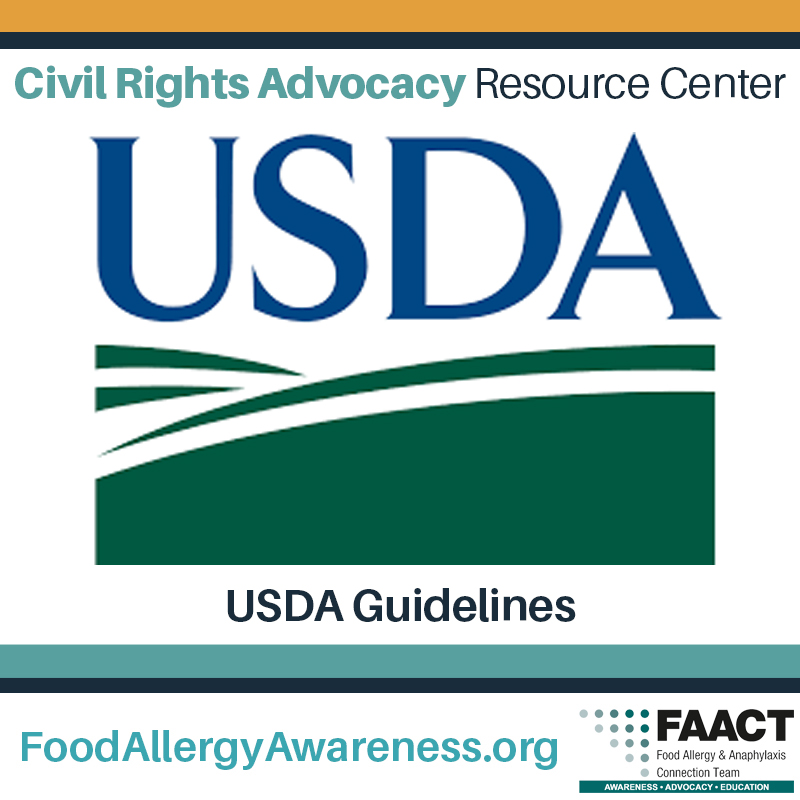Accommodations

USDA Guidelines for “Accommodating Children with Disabilities in the School Meal Programs: Guidance for School Food Service Professionals”
The USDA Guidelines for Accommodating Children with Disabilities in the School Meal Programs: Guidance for School Food Service Professionals governs how school districts that participate in the National School Lunch Program (NSLP) and School Breakfast Program (SBP) accommodate children with special dietary needs. It also governs participants in the Fresh Fruit and Vegetable Program (FFVP), the Special Milk Program (SMP), the afterschool snack component of the NSLP, and the Seamless Summer Options (SSO).
USDA Regulation 7 CFR Part 15b requires schools who participate in the above listed programs to provide substitutions or modifications to school meals when a student’s disability limits or restricts his or her diet. Such special meals must be provided at no additional costs to a student whose disability restricts his or her diet.
Additionally, the USDA Guidance document and SP 59-2016 specifically emphasized “the main focus for SFAs (school food authorities) should be working collaboratively with families so that children with disabilities have an equal opportunity to participate in and benefit from the NSLP and SBP.” It goes on to state “SFAs and local educational agencies (LEAs) should not be engaged in weighing medical evidence against legal requirements in order to determine if a medical or physical condition meets the definition of a disability. After the passage of the ADA Amendments Act, most physical and mental impairments constitute a disability.” The guidance further notes that while SFAs are specifically responsible for providing the necessary meal modifications for children participating in the meal programs, the ultimate responsibility for accommodating children with disabilities is on the school district. Furthermore, state agencies are responsible for ensuring that LEAs comply with the requirements of disability laws.
USDA Guidance Regarding Food Allergies
The current, revised USDA guidelines address food allergies very strongly. The guidelines instruct that when a modification request is made, said request applies to any food items and ingredients that are offered to the student. The guidelines specifically state “[w]hen accommodating a child’s food allergy, no food item offered to the child may contain traces of substances that may trigger an allergic reaction.” The guidelines require SFAs to check food labels and specifications of food items to ensure they do not contain the student’s allergens and recommend providing the student’s parent or guardian with copies of all breakfast and lunch menus to allow them to address potential concerns. They further state that in situations where the food label does not adequately provide information regarding ingredients and possible cross-contact or trace allergen protein, it is the responsibility of the school food service to obtain the necessary information by contacting the manufacturer, the State agency, or other private organizations for assistance.
The guidelines also require the SFA to provide “a safe environment to consume the meal” and to ensure proper storage, preparation, and cleaning techniques. They further state that it is “best practice” for schools to educate students of the importance of avoiding food sharing with their peers and encourage schools to add food allergy education to other coursework, such as health and wellness lessons.
Additionally, the guidelines offer information on food labeling and how to recognize an allergic reaction.
Requirements for Meal Modifications
For a SFAs to receive Federal reimbursement for meal modifications that do not meet the USDA Program meal requirements, SFAs must require a written statement from a State licensed healthcare professional (such as a doctor, nurse practitioner, or a physician’s assistant) supporting the student’s need for substitutions. The physician’s statement must contain: information about the child’s physical or mental impairment that is sufficient to allow the SFA to understand how it restricts the child’s diet, an explanation of what must be done to accommodate the child’s disability, and the food or foods to be omitted and recommended alternatives. Additional information may be required in specific circumstances, such as when a student requires an elemental formula. SFAs may elect to request a similar written statement in support of a modification request that is within the USDA Program meal pattern, but such written statement is not required by the USDA. Additionally, if the student’s 504 Plan or IEP includes the information required in the medical statement or if written medical verification is obtained by the SFA during the 504/IEP accommodation plan process, a separate medical statement is not required by the USDA.
Previous USDA Guidelines
The USDA updated this guidance document in May 2017 to “better align with Congressional intent” and the Americans with Disabilities Act (ADA) Amendments Act of 2008 and to conform to USDA Policy Memorandums SP 59-2016 and SP 59-2017. The previous USDA guidelines were written in 2001 and did not reflect the changes to disability laws that have occurred since 2001, including the Americans with Disabilities Amendments Act of 2008, under which the U.S. Department of Education, Office of Civil Rights, and the U.S. Department of Justice determined that food allergies may be deemed a disability which would require accommodation when the food allergy limits a major life activity, such as eating, breathing, and the process of digestion.
FAACT appreciates the USDA’s efforts in revising these guidelines, and in particular, their attention to the needs of students with food allergies.